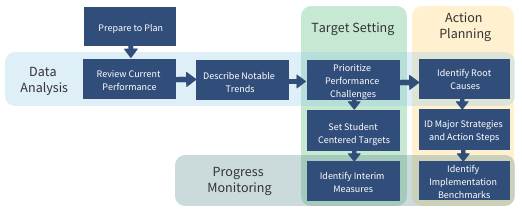You are here
Improvement Planning and Early Learning
All schools and districts serving K-3 students are encouraged to assess their needs related to early childhood as a regular part of the Unified Improvement Planning (UIP) process. The early learning needs assessment supports schools and districts in analyzing the needs and learning of children from birth through age 8. This process can strengthen relationships between schools, districts, and early childhood partners to more accurately identify needs within the community, monitor trends, and inform the implementation of preventative strategies.
Implementing Research-Based Early Learning Strategies in the Education Accountability System (PDF)
View the Early Learning Needs Assessment Webinar Recording (August 2021). For PowerPoint slides and additional information, view the Trainings and Meetings webpage.
Overview
The CDE encourages all schools and districts serving K-3 students to assess their needs related to early childhood as a part of the improvement process. Similarly, the Colorado General Assembly expanded accountability requirements to establish minimum early learning needs assessment requirements and to require the identification of related improvement strategies for specific schools and districts (1 CCR 301-1):
- Public schools and charters operating under a priority improvement or turnaround plan, and who serve students in grades K-3 (§22-11-405; §22-11-406)
- Districts that have a school serving students in grades K-3 and are operating under a priority improvement or turnaround plan (§22-11-305; §22-11-306). Please note this is unique statute requiring districts to act based on the school’s plan type.
Who to Involve in the Process
To gather the data most effectively and efficiently, school and district leadership are advised to include early childhood administrators. For school-level assessments, this may include:
- District or school Early Childhood administrator, Early Childhood Special Education administrator
- Community program directors, other local early childhood agencies, and resources, i.e., libraries, local mental health agencies, and human services.
For district-level assessments, this may include:
- District Early Childhood administrator, Early Childhood Special Education administrator, BOCES, or Child Find Coordinator
- Local Early Childhood Council Coordinator
- Local Coordinating Organization
- Local Head Start Grantee
- Other Early Childhood resources, i.e., library system, family resource centers, mental health, and human services departments
Please refer to the Early Learning Needs Assessment Data Sources Guide to see the connections with each data source. The CDE recommends collaboration with the district and school in involving local partners. Some schools may also need to consider involving those listed for district leadership depending on their location and/or the size of their district.
Early Learning Needs Assessment Minimum Requirements
-
Quality early childhood programs exist within a school’s or district’s geographic boundaries
-
Students are enrolled in early childhood programs that receive either state funding or School Readiness Quality Improvement funds prior to Kindergarten entry
-
A public school or district works with their local Early Childhood Council and other Early Childhood Community Agencies
-
A public school or district collaborates with EC programs on Preschool-Kindergarten transitions
-
K-3 teachers have EC teaching credentials
-
Professional Development provides joint learning opportunities and collaboration between EC providers, teachers, and principals
-
Family Engagement plans provide opportunities for Preschool-3rd grade
-
Availability of other Early Childhood Resources
For schools operating under a turnaround plan:
-
The ELNA includes a complete analysis of early elementary student achievement data and research-based next steps to improve early childhood programs and partnerships.
Please refer to the ELNA Data Analysis Template for one possible way to organize and analyze data sources that meet and exceed the minimum expectations of an early learning needs assessment. This provides a template for reviewing current performance in relationship to early learning and sample summary tables of possible ways to review the data to identify trends.
For details in analyzing the required data sources listed, the CDE has created additional resources.
Early Learning Needs Assessment Data Sources Guide
Embedding Early Learning Data Sources in UIP
Data sources can be embedded within the existing UIP process.
Documentation and Submitting within the Unified Improvement Planning Online System
Add summary and analysis within the Root Causes of your school and district UIP (under: Provide a rationale for how these Root Causes were selected and verified). If appropriate, document research-based Early Learning and Development strategies within the Major Improvement Strategies. See the UIP Quality Criteria Rubric for more information.
1 CCR 301-1 ADMINISTRATION OF STATEWIDE ACCOUNTABILITY MEASURES FOR THE COLORADO PUBLIC SCHOOL SYSTEM, CHARTER SCHOOL INSTITUTE, PUBLIC SCHOOL DISTRICTS AND PUBLIC SCHOOLS
For more information, contact Megan Rogers or Lauren Hesse.



Connect With Us





